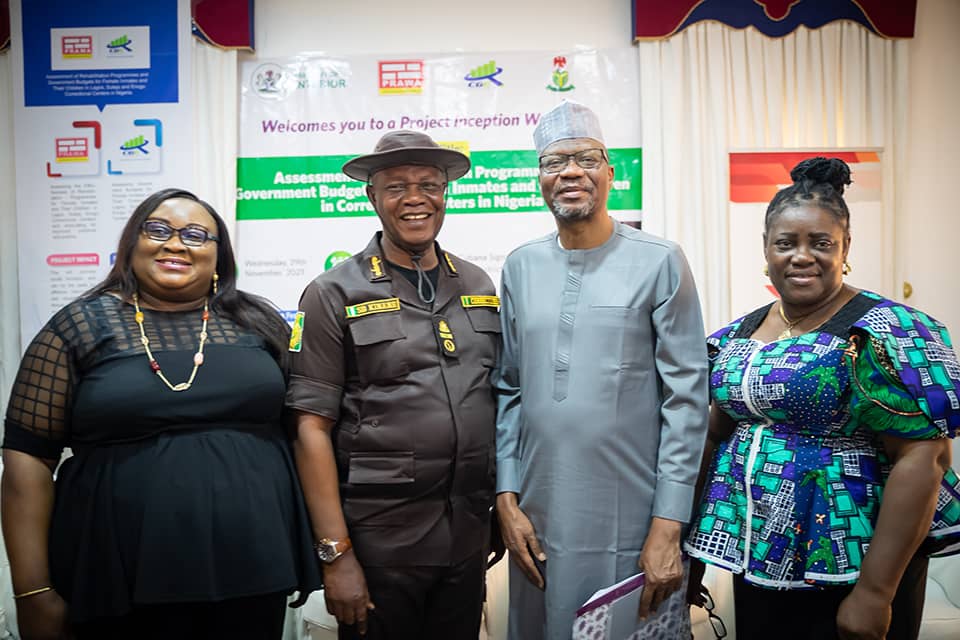The Center for Gender Economics in Africa (CGE Africa) has canvassed for a gender-responsive budgeting that will prioritise the basic needs of female inmates and their children across custodial centers in the country.
Its Executive Director, Uchenna Idoko, made the call in Abuja during a project Inception meeting on assessment of rehabilitation programmes and government budgets for female inmates and their children in Nigeria organised by GCE Africa and Prisoners Rehabilitation Welfare Action (PRAWA), in partnership with the Nigerian Correctional Service (NCoS) supported by MacArthur Foundation.
According to Idoko, the project aims to “evaluate the current budgetary allocations for correctional centers in Nigeria, specifically focusing on provisions for female inmates and their children, identify gaps and challenges in the existing budgetary framework regarding gender-specific needs within correctional facilities. and propose recommendations among for a more gender-inclusive budgeting approach that addresses the basic needs of female inmates and ensures their well-being and dignity.”
“We acknowledge our responsibility to advocate for women across every corner of Africa who encounter barriers hindering their access to fundamental economic opportunities and their ability to benefit from government economic policies and financing.
“Our commitment involves understanding the reasons behind these challenges through research such as this assessment and advocacy; we strive to bring about policy and practice changes. We aim to empower women to access their basic and strategic gender needs, fostering a more inclusive and equitable economic landscape,” she said.
She further stressed the need for measures to ensure that female inmates are well taken care of in terms of menstrual hygiene, mental wellbeing and of children, education and skills development as well as the provision of economic empowerment for reintegration.
Earlier, the Director Nigeria office of the MacArthur Foundation, Kole Shettima, pointed that women and children have certain vulnerabilities which must be highlighted especially when it has to do with their detention in custodial centers and that is why we are here looking for ways to intervene to better their welfare while in custody
According to him, “We are trying to bring up this issue to public attention by because probably many people may not be aware of the situation of female inmates and the reality that many of these women and children are in this institution over minor offences.
“Probably what they have done or accused of doing is insignificant compared to many of our politicians and big people who have succeeded in rigging the criminal justice system in their favour and have escaped justice up to now. Comparing their situation with that of the big people, is one way to highlight the problem that WWE have in the system.
“I think that this meeting that brings together stakeholders like the correctional service, civil organisations and they media itself, I think that whole societal approach whereby everyone of us involved comes together and highlight the situation.
“Those of us who have the resources and other things, I think that we can individually contribute in that direction, those of us that have institutions can support them by providing means of livelihood, I think thank everyone has something that we can do to improve their welfare.”
Controller General of the Nigerian Correctional Service, (NCoS), Haliru Nababa, said that the Nigerian Correctional Service Act provides for the wellbeing and welfare of inmates especially the females.
“The Act has made very elaborate provisions on the treatment of females and children in our custody and Controller General has strived consistently to ensure that it is being done.
“For instance, the nomenclature has changed from female prison to female custodial facilities which is more humane, it is a paradigm shift from punitive to correctiions. Also we have a gender unit at the national headquarters, being supervised by the welfare section so you can see that the institution has put in place a lot of correctional interventions,” he said.
Represented by the In-Charge, Welfare Services under the Directorate of Health and Social Welfare, Assistant Controller of Corrections, Dr. Suanu Kinane, the CG said non-custodial measures are also explored under welfare considerations for female inmates in accordance to the magnitude of crime or offence committed.
Speaking on the negligence of the peculiar needs of women in custodial facilities, importance of Executive Director, Prisoners’ Rehabilitation and Welfare Action, (PRAWA), Dr. Uju Agomoh, said the detention of women in prison leaves in its wake devastating impact on the family.
She notes that “The peculiar needs of women are not being attended to and there are a lot of different issues relating to women in custody. Once a woman is in custody, there are a lot more effect on the family to a great extent.
“We need to look at the fact that there is a new law; Section 34 of the Nigerian Correctional Service Act that puts certain clear things about what had to happen to women and under section 35 what had to happen to young people in custody but the question is, to what extent are we implementing these?
“This particular programme is to enable us to a searchlight to an area that is usually very ignored and also an area that will help a lot in terms of providing comprehensive reform that is sustainable and otherwise.
Dr. Agomoh adds that “You will never see a man who is in custody with their baby. In all the 244 correctional centers, there is no place you will see a male who is in custody with a child but you will see women who are in custody and they are pregnant, you will see women who are in custody and they are breastfeeding a child and all of that.
Although the law say if the child is 18 months, somebody should take them but there are a lot of complications.”
